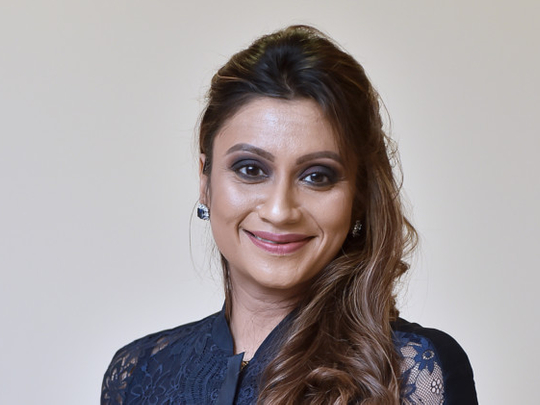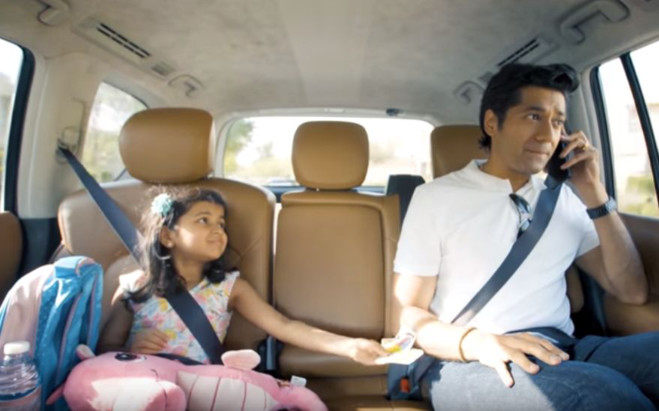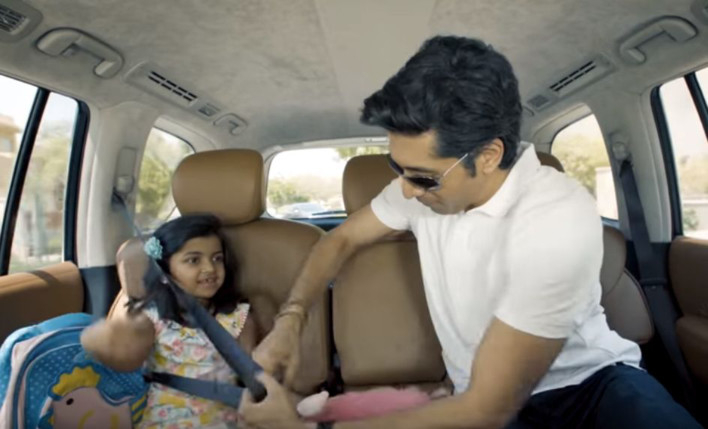
A film warning parents of the hazards their children might be exposed to online was recently released in the UAE.
Director and producer Zenofar Fathima says she hopes her short film, The Peril, acts as a wake up call for parents who, because of the demands of a work, sometimes compromise on the security of their children.
“As parents we must take responsibility of the safety of our children. We have to take the future of our children in our hands and being busy is no excuse to neglecting their well-being,” Fathima says.
The Peril revolves around a father and his daughter who travel together to spend their holidays away. The father, a businessman with a hectic work life, in an attempt to give in to his five-year-old daughter’s needs, leaves her with a gadget with unsupervised access to the internet. Through visual narration, the film then transitions into the dangers that the girl is exposed to online.
“There is a change in the child’s behaviour when they are using the internet more than usual. It affects their mental as well as physical well-being and it is of no good to witness our very own blood under the influence of these gadgets losing their ability to read properly or not being able to do other activities efficiently,” explains Fathima.
A Unicef report on children in a digitised world last year called for “faster action, focused investment and greater cooperation” in an attempt to not only protect children from the harms of the digitised age but also for them to benefit from the ever-growing upgrades in technology, positively.
“The internet was designed for adults, but it is increasingly used by children and young people — and digital technology increasingly affects their lives and futures. So digital policies, practices, and products should better reflect children’s needs, children’s perspectives and children’s voices,” Anthony Lake, Unicef executive director, said in the report.
In an attempt to understand Fathima’s perspective better, Gulf News tabloid! spoke to UAE-based parents to understand their concerns for their children.
1. Rocky Pabalan, 34, and his wife Bernadette are from the Philippines and have been living in the UAE from the past 10 years. The father to five-year-old Harriette Blair Pabalan expressed his concern over the content that his daughter is exposed to online. “If she finds something abnormal whilst she is watching videos online, I’ve noticed her withdrawing and giving her gadget away, either to me or her mother,” said Rocky. He explained that he always manages to spare some time to educate her of the difference between the content that is suitable for her to watch and that isn’t.
2. Randeep Kaur, 42, currently works as a primary teacher in a school in Sharjah. Due to her busy schedule it is extremely burdensome for her to supervise both her sons Arshpreet, 11, and Ravteg, 7, every time they use the internet.
“Even though we’ve explained to them the risks of sharing personal information online, as their guardians we are always concerned about what they are accessing on the internet. One particular hazard that scares me the most is the idea of my children interacting with strangers online,” Kaur says.
In an attempt to keep them busy and divert them from using gadgets frequently, she has enrolled both her boys at a sports academy.
3. British couple Chris and Gaenor Jones, parents to 10-year-old Morgan, are completely against the idea of their son chatting with adults online. A simple strategy both of them adopted to stop their son from getting addicted to the internet, was to restrict his gadget usage to a limited period of time. Both parents have worked in the UAE from the last 10 years and have exhausting work schedules. They’ve linked all the activity from their son’s gadgets to their email ID and also keep a regular check on the history of all the content he surfs throughout the day.
4. Nimmi from Sri Lanka has been working in the UAE for last 18 years. She is a mother to two boys Thivina, 16, and Dilana, 12. Nimmi makes sure she keeps in touch with Thivina’s friends. According to her observation, her son is very selective with his close friends, which is why she trusts him with his decisions. “Nowadays I believe that our children have more knowledge about technology than us, I am confident that my elder son knows what is good and what is bad for him. Every time I interact with him, from the way he talks, I can say that I have faith in him and I do trust him. But I am genuinely worried about my younger one. He is 12 now and he is very much into video games,” Nimmi says.
5. Singaporean Glen Tan, 46, works as a business consultant and has been living in UAE since 2013. He has three children with his wife Stephanie Zhou — Conrad, 5, Megan, 4, Lucas, 3. He is worried about the growing number of problems from the world of technology these days. According to him, parents are responsible for introducing their children to a basic moral compass that teaches them values such as compassion, fairness and care for people irrespective of colour and caste. “As our children grow up, we cannot stop them from what they do but if we are a bigger part of their life, we can always somewhat stay close, navigate them to the right decision,” Tan says.
DOCTOR SPEAK
Dr Daniela Graf, who is currently practicing at German Neuroscience Center as a Specialist for Child and Adolescent Psychiatry and Psychotherapy, on how parents can stay vigiltant while their kids are online:
What activities do you think parents can adapt in the constrained but necessary time that they spend with their children?
Kids in general are more frugal than we expect them to be. Parents often wrongly assume that they need to offer their kids the most fancy and expensive activities to satisfy them or to make up for the little time they have left for them due to their busy jobs. My experience as a child psychiatrist is that these little things like being a good listener, giving a hug, cuddle time, playing a simple board game, drawing together, cooking together, have a walk at the beach, showing interest in their lives, going to the playground together or simply telling them how much you love them are more than sufficient to make a kid truly happy. It’s the quality time that counts and not the quantity of time you spend with a child.
What strategies do you recommend to parents in order to make their children more aware of hazards online?
The first one would definitely be to inform their child about any potential dangers. Explain with examples such as: teenage girls shouldn’t use dating apps and date old men or send them pictures... or that you are not supposed to give bank account details to anybody online. The second one is to introduce your kids to alternatives for their free time. They tend to spend their time online because they are bored or feel neglected.
How does excessive use of the internet affect a child’s behaviour?
A few changes that one can notice in a child’s behaviour as a result of being online more than usual are: social isolation, depression, aggression and lack of concentration in everyday activities.
When does a risk turn into harm?
A risk turns into harm when the subjects seen on the internet are not age-appropriate. A very basic example would be, when a six-year-old child watches a horror movie, it can cause the child to have nightmares, sleep disturbances, bedwetting and anxiety attacks.
Have you heard of the Blue Whale Challenge game? Could you explain how such games influence a child mentally?
Yes I have heard of it. The Blue Whale Challenge is a social network phenomenon in existence from 2016 that is claimed to exist in several countries. It is a ‘game’ reportedly consisting of a series of tasks assigned to players by administrators over a 50-day period, innocuous before elements of self-harm are introduced and the final challenge requiring the player to commit suicide.
Children with anxiety disorders, social phobias, depression, borderline personality disorders are usually the ones most vulnerable to such games. Generally such kids feel like they’ve lost control of their lives and don’t know where they’re going. Playing such games makes them feel like they are being guided to somewhere better. Regaining that power and the feeling of being in control is very alluring to these children/adolescents.
What age groups are often found getting influenced by peer pressure? How can parents detect that their child is under peer pressure and how can they deal with it?
Usually, all age groups are under peer pressure. However, the consequences of breaking rules in a peer group is the worst in teenagers from the age of 13-16. Parents can detect it by talking to their child directly, or to the teachers and parents of their friends/classmates.
How to deal with it: strengthening the child‘s self-esteem by telling him/her that it’s absolutely OK to say ‘no’ to something, to have your own wishes, dreams and goals and by making them realise that true friends will accept and tolerate their opinions even if they are not conforming with the ‘mainstream opinion’ in the peer group.
— Pavneet Kaur is an intern at Gulf News.















